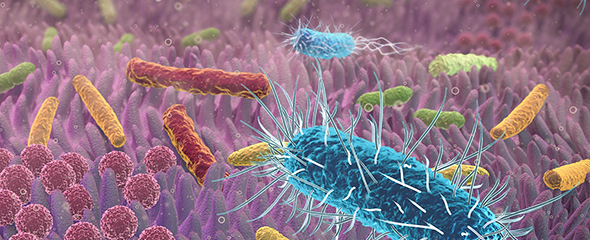Dietary fibres from our food are decomposed by the local bacterial community in the large intestine to produce short-chain fatty acids, as well as other substances. This provides an energy source to the human body that it would not be able to utilise with just its own means. More than 70 percent of the energy metabolism of intestinal epithelial cells is accounted for by these fatty acids. The most important energy source for intestinal cells is butyrate. Butyrate produced by microorganisms is essential for the preservation of our health. In addition to providing food to intestinal cells, this substance controls the immunological defence of the intestine and also affects various metabolic pathways in the entire body, for example in the liver and in the brain.
Their health-promoting effect has moved butyrate-producing bacterial communities into the focus of current microbiome research. The researchers aim to better understand the diversity and ecology of these species in various regions of the intestines.
Chronic butyrate deficiency has been associated in a number of publications with the manifestation of diseases such as type 2 diabetes, obesity and cardiovascular disease. In addition, it increases the risk of infectious diseases in the intestine
"The butyrate-producing community in the intestines consists of many strains of bacteria and is a biochemically diverse group," Vital says. "Many different bacterial species are involved, especially various species of Firmicutes and some Bacteriodetes. However, the functional performance of the entire bacterial community in the intestines is often neglected, which makes a comprehensive analysis of butyrate production potential difficult."
In their scientific work, the HZI researchers now developed a workflow for detailed identification and quantification of the composition of butyrate-producing bacteria and for revealing their biochemical and taxonomic diversity. For data analysis, the researchers combined information from different publicly accessible data sets from patients suffering from different diseases such as diabetes, obesity and liver cirrhosis. This allowed the researchers to identify key ecological features of these functional bacterial communities and to obtain important information concerning their role for human health.
The HZI researchers found out that, on average, more than 20 bacterial species in the intestinal flora are capable of producing butyrate in any person. "Our study showed that many bacteria produce this fatty acid that is so important to us," Marius Vital says. "The large diversity of the butyrate-producing bacterial species helps maintaining the functional stability of the intestinal microbiome day-in, day-out and can reduce even major impacts such as an antibiotic treatment." Nutrition was also found to have an influence on butyrate-producing bacteria that increased their expression of genes for the production of butyrate in a vegetarian diet compared to the excessive consumption of meats. Moreover, the researchers were able to confirm that a deficiency of butyrate-producing bacteria is associated with various widespread diseases such as diabetes, atherosclerosis and obesity.
The results of the HZI researchers may help in the future development of individually designed medications in an effort to prevent so-called functional dysbiosis – which is a lack of a health-promoting function that can be provided by various bacterial species – and to reduce the manifestation of diseases by this means.
Original publication:
M. Vital, A. Karch, D.H Pieper: Colonic Butyrate-Producing Communities in Humans: an Overview Using Omics Data. mSystems, 2017, DOI: 10.1128/mSystems.00130-17

